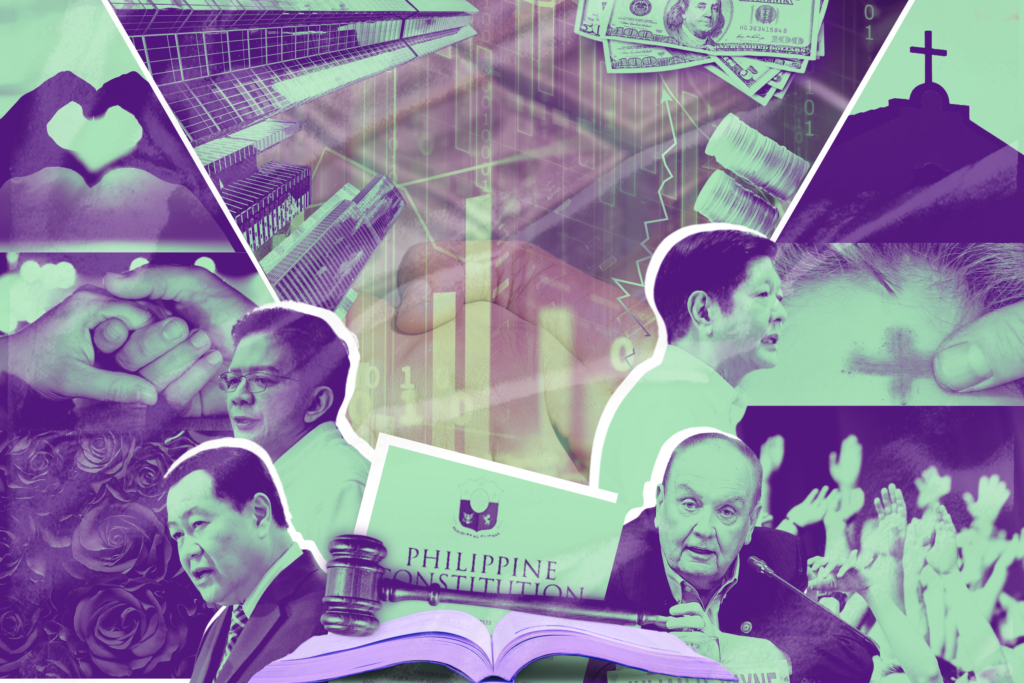From the Newsrooms: February 11 to 17, 2024
Economic Chacha debate continues as critical sectors express their positions

WITH PRESIDENT Ferdinand Marcos Jr’s clear signal of his approval, it was no surprise for the media to pick up the heightened discussion of charter change (Chacha) in the Senate.
On February 12, the Senate was clearly engaged in the process as its Subcommittee on Constitutional Amendments and Revision of Codes began its second deliberation of the Resolution of Both Houses No. 6 amending three constitutional provisions on the economy, focusing on public utilities, education, and advertising. The committee hearing made headlines as framers of the Constitution, law experts, and representatives from foreign chambers expressed their positions on the issue.
The President in his speech during the Constitution Day on February 8, made clear that the administration’s stand on reforming the Constitution “only extends to economic matters…nothing more.” At the beginning of 2023, Marcos stated that Chacha was not a priority for his administration. However, on December 15 of the same year, he said in a speech that the government was examining the need to change some economic provisions in the Constitution to boost foreign investments. His latest speech marked the first time he gave his clear position on the economic Chacha.
Reacting to the President’s speech on February 11, Senator Francis Escudero told 24 Oras that Malacañang still has “no solid position” on the issue. The President has yet to specify which constitutional provisions needed amendment. 24 Oras then recalled that Marcos previously stated that the country needs to relax laws on foreign ownership, except for some critical sectors such as media and power generation.
Former Justice Associate Antonio Carpio, who attended the Senate hearing, hit national leaders endorsing economic Chacha for their lack of understanding of the law. On February 12, GMA News Online quoted Carpio during his Senate appearance saying that even without Chacha, there are already existing laws supporting foreign ownership, naming two. The Public Services Act enables “the liberalization of key public services by allowing full foreign ownership of businesses in select industries such as airports, railways, expressways, and telecommunications.” The Retail Trade Liberalization Act’s foreign equity partnership provision was amended in 2021 to encourage foreign engagement and investment in the retail trade business.
Inquirer noted the points of agreement and disagreements in the positions taken by the framers of the 1987 Constitution, who are opposed to charter change; and the foreign chambers, who support the lifting of current limitations for their businesses.
Julian Payne, president of the Canadian Chamber of Commerce of the Philippines, said that removing economic restrictions would “facilitate increased foreign investments in sectors where such investment is currently restricted.” But he also noted that protection of foreign interests can be done through legislation or executive action, and not necessarily by changing the Constitution.
The report noted that several members of the Joint Foreign Chambers agreed said that foreign investors were turned off not by ownership limits “but by bureaucracy, red tape, and corruption.”
Valentine’s Day, Ash Wednesday
This year, February 14 doubled up for the observation of two contrasting traditions, the secular Valentine’s Day and the religious Ash Wednesday. This alignment was marked with contradictions as Valentine’s Day promotes consumerism and commercialism while Ash Wednesday marks the beginning of Lent, a period of reflection, abstinence, and restraint. Inquirer.net noted the last time the two occasions coincided in 2018, adding that it would happen again in 2029.
Interestingly, the media highlighted the survey conducted by Social Weather Stations (SWS) that found money as Filipinos’ top Valentine’s Day gift wish which indicated a shift from romance in the practice of gift-giving. Sixteen percent of the survey respondents said they would want to receive money; 11 percent wished for love and companionship; 10 percent wanted flowers.
On the same day in Bulacan, the collapse of a church balcony of the St. Peter Apostle Parish Church caused the death of one devotee and injuries to 49 more. According to reports, the church’s mezzanine was termite-infested. Manila Bulletin reported that a Bulacan bishop already ordered the inspection of the structural integrity of all parishes in the province.
Meanwhile, in other news:
- Media continued to give updates on the ongoing search and retrieval operations of victims in the Davao De Oro landslide which occurred on February 6. As of press time, the death toll had risen to 98.
- With scattered rainfall, Mindanao continues to experience flooding. Frontline Pilipinas reported on February 17, that floods submerged more than 200 villages in Agusan Del Sur affecting more than 800 families who were already evacuated.
- Government authorities are currently investigating the series of bomb threats received by several government agencies in the past week. On February 13, authorities identified Japanese Lawyer Takahiro Karasawa as the suspect in the bomb threats directed at the Department of Education in Bataan and the Department of Environment and Natural Resources in Quezon City. Karasawa introduced himself in his email to the said organizations. Cybercrime Investigation and Coordinating Center said this was not the first time the country received similar threats from the same email. Inquirer reported on February 14, that the Philippine National Police had reached out to Japanese authorities who said that the lawyer denied any involvement in these bomb scares and is now cooperating with them in the investigation.
Leave a Reply